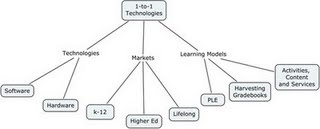I have been reading the comments on the dipity timeline from our presentation and wanted to address a few points. Thanks to everyone who left comments on the timeline. It would have been great to link the comments directly to the blog, but here are my responses (read: these are my thoughts, not the whole group’s).
First there were several comments that OSS does not protect the intellectual property rights of the creators. I agree that there is a real need to protect intellectual property rights with regard to software creation. However, in proprietary settings the code writers never get credit and it is the corporation or business that benefits financially from their work the most and holds all the rights. Microsoft pays it’s programmers well, but they are not doing nearly as well as Bill Gates. At least in OSS, if the software is licenced under GPL or Creative Commons, the actual programmers get to keep the IP rights to their work. If they want to develop a business around providing services to users of the product they are free to do so. If someone creates a derivative work on the shoulders of what I have done, then the IP rights to the new work should lie with them, but I would want to be credited as having made the original source.
Second, several people commented that they were surprised that ‘open-source’ style software predates PS. I truly believe that hardware and software development would have been seriously hindered if in the early days of computers there had not been a free and easy exchange of information and software between researchers and programmers. Science moves forward through the sharing of ideas, not just competition (although competition is a significant factor). One of the aims of the F/OSS community is to foster the development of new ideas and collaboration.
Lastly, I think we have to consider that OSS actually combats software piracy by giving people a viable alternative to buying shady copies of Microsoft Vista on the street corner. It also means that students can learn to use a wider aray of applications and programs than a school could provide if they had to pay high prices for software. Also students can take OSS home and extend their learning, as Eveline mentioned in one of her comments.
As we move towards things like Software as a Service, will the software we actually install on our machines continue to be something we want to pay for? Or will we be more willing to pay for services and support for software that is distributed at low cost?

